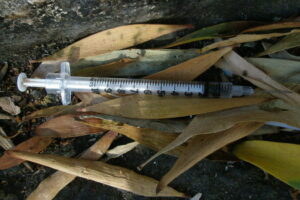People-pleasing – the inability to say “no”- is common in addicts/alcoholics. It is especially common in health professionals pre- and post-Recovery.
Health professionals in general are prone to taking on extra work, accepting other people’s shifts, double-booking, working additional hours to “help a colleague out,” making promises that are impossible to keep, trying to be in two or three places at the same time… Sound familiar? It seems baked into the job description of the health professional to be self-sacrificing to the point of self-annihilation. It is a harmful tendency in all health professionals, but it is particularly dangerous in the recovering alcoholic/addict who happens to work in health care.
I know a prominent clinician in Recovery who had such a difficult time saying “no” in his professional life that he eventually resorted to carrying a card in his pocket with the word “NO!” prominently displayed on it. He would pull the card out when it was necessary for him to set limits or boundaries and communicate this to somebody at work.
If we always say “yes,” we become doormats. Our “yes” answers cease to have any value. We are taken advantage of and we become known as “go to” patsies when someone is looking for a shift to be unloaded or for some other favour. On the other hand, if we learn to say “no,” then our “yes” answers become meaningful and gain value and recognition. We develop a backbone and become respected by our colleagues.
As health professionals in early Recovery, it is important not to return to work too soon. There is pressure placed on nurses, doctors, pharmacists and others in the health sector to return to work as soon as possible. As people-pleasers, we want to placate everybody and put our Recovery behind us to get on with our professional lives. Often, our spouses are less than supportive and join in the general pressure to “get back to normal” quickly. This is a recipe for disaster. Relapse often follows, along with dire consequences. Although return to work is really a separate topic, I mention it briefly here because the motivation for a premature return to work is often people-pleasing.
In summary: it is important to learn to say “no” in Recovery – not just “no” to substances, but also to people-pleasing. We need to set limits and boundaries in our lives. Addicts and alcoholics very often lack personal boundaries. It is very difficult for them to say “no” to people. Therefore, practice saying “no” to your spouse, your children, your friends. When you become comfortable saying “no” to your family and friends, you can practicing saying “no” at work. This is not an issue that is typically discussed much at community fellowship meetings, but it is very important for addicts/alcoholics, especially for health professionals in Recovery!




1 Comment
Leave your reply.